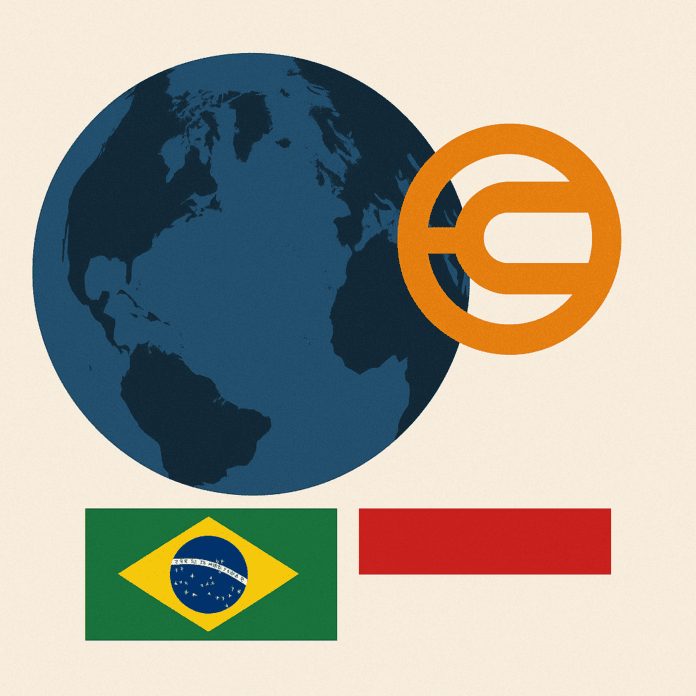World, OpenAI CEO Sam Altman’s digital identification project, has secured $135 million in funding from two venture capital firms named Andreessen Horowitz and Bain Capital Crypto. As of now, the funding is to be allocated for enhancing the infrastructure and iris scanning in the United States (US) and abroad.
To establish a “proof of personhood,” World has issued 12.5 million World IDs via biometric data collection. These IDs span across 160 jurisdictions. As the Global ID project gains traction, Worldcoin’s ambition of expansion has been met with regulatory hurdles from countries like Brazil and Indonesia.
Worldcoin has also been criticised for offering monetary incentives for biometric data collection. Critics argue that these incentives compromise informed consent and raise ethical issues related to centralised digital ID systems and data privacy. For now, the project’s traction remains a mix of regulatory scrutiny from some and acceptance from others.
Worldcoin Expansion Meets Regulatory Scrutiny In Indonesia
Recently, Indonesia has decided to ban the operations of World, previously known as Worldcoin, and WorldID services. The regulatory scrutiny poses a severe challenge for the Worldcoin expansion, keeping it from entering emerging markets like Indonesia.
The decision to halt the Worldcoin expansion was made by Indonesia’s Ministry of Communications and Digital Affairs (Komdigi) after World services were found to be in violation of the nation’s regulations and is primarily based on two reasons.
To start off, the company that’s responsible for the operations of Worldcoin expansion in Indonesia is PT Terang Bulan Abadi. According to Indonesian law, the organisation is required to register as an Electronic System Operator (PSE) but has failed to do so. Additionally, PT Terang Bulan Abadi did not possess the required TDPSE certification for legal operations in the country.
Furthermore, we found severe violations of transparency and legal accountability regulations in the services related to Worldcoin’s expansion and operations. These legal charges stem from the fact that the Worldcoin expansion and operational service were using the registration certificate of another entity named PT. Sandina Abadi Nusantara.
The Director General of Digital Space Supervision, Alexander Sabar, had claimed that this suspension was initiated due to community reports of suspicious activities. Given this, the communication and digital affairs ministry of Indonesia had stated earlier that it would go on to summon the representatives of the companies involved in these allegations.
These representatives will be asked to provide clarification and address these violations. Sharing insight into that matter, a statement from Alexander Sabar reads:
“This freezing is a preventive measure to prevent potential risks to the community. We will also summon PT. Terang Bulan Abadi for official clarification in the near future.”
Worldcoin And Indonesia’s Legal Climate
As far as the regulatory infrastructure is concerned, Indonesia is currently developing a legal framework for digital activities to deal with cryptocurrencies and the blockchain. In 2022, the nation implemented the Personal Data Protection Law (PDP), enforcing strict protocols for collecting and using personal and biometric data.
Currently, the legal regulations in Indonesia require all digital service providers to register with Komdigi and adhere to security standards. In addition, cryptocurrency activities are required to be reported to Indonesia’s Commodity Futures Trading Regulatory Agency (Bappebti).
It’s worth noting that the Worldcoin expansion and operations ban is part of the government’s efforts to safeguard the national digital space. It serves as a clear warning that non-compliance pertaining to user privacy will not be tolerated and that projects like Worldcoin must ensure transparency in their operations and data handling practices.
While some see the Worldcoin ban as an act of scrutiny, Indonesia claims that it has been implemented to ensure user and data protection and set standards that projects like Worldcoin would have to follow when it comes to building trust with users and regulations.
Brazilian Ban Halts Worldcoin Expansion
Apart from Indonesia, countries like Brazil have also implemented a ban on Sam Altman’s brainchild, making it explicitly clear that Worldcoin is not welcome. The Brazilian decision comes from the fact that the National Data Protection Authority (ANPD) has raised concerns pertaining to how the Worldcoin expansion and operations collect and use data.
Authorities believe that offering monetary incentives for biometric data collection is unethical, as it may make some people eager to share personal information they otherwise would not share. The perspective is in line with Brazilian regulations that favor customer protection and financial stability as opposed to jumping into new financial projects.
The ban had a significant impact on the World’s Global ID project, favouring Worldcoin expansion. In fact, when the Worldcoin Brazilian ban was implemented, trading volume dropped by 43% in just a single day. This significant decline clearly highlights the investors’ sentiments towards new crypto projects.
One of the key realities that can be extracted from this trading volume drop is that investors are not willing to place their hard-earned money into cryptocurrencies that are at odds with governments or are being scrutinised by them. Brazil’s ban on Worldcoin highlights that the nation prioritises regulatory compliance over new technologies and hints at what the future has in store.
Global ID Project Traction And Future Outlook
Coming to the current-day scenario, it can be stated that the future for Worldcoin expansion doesn’t come with a streamlined path. Currently, Worldcoin has made significant progress by having around 12.5 million World IDs from 160 jurisdictions. World ID has also built utility competence by having over 100 million users.
These uses are spread across third-party applications and indicate some integration into digital services. However, it’s worth noting that this massive user adoption is driven by the incentive of WLD token rewards. As a result of such an incentive scheme and its data collection and use practices, Worldcoin has come under regulatory scrutiny from countries.
Nations such as Kenya, Spain, Hong Kong, Germany, Portugal, Colombia, and South Korea have resorted to either banning the Worldcoin expansion operations or launching investigations into its practices. The primary reasons for the bans and investigations include concerns about data protection, privacy, informed consent, and regulatory compliance.
Worldcoin launched with a price of $2.18 back in 2023. Then, it had gained traction and had reached an all-time high of $11.89 in March 2024. But, since then, prices have been on the decline and have struggled to cross the one-dollar mark, especially in 2025.
Given the current downward trajectory of the Worldcoin price, it can be a feasible, even profitable, investment if the global regulatory attitude towards the project changes. To determine whether such a reality will prevail, investors should follow the regulatory changes made by nations and compliance efforts made by the world.
Frequently Asked Questions (FAQs)
Why are countries banning Worldcoin?
Worldcoin has been banned by multiple countries, like Brazil and Indonesia, for concerns over their regulatory compliance and data collection and use practices.
Is it safe to invest in Worldcoin?
Determining whether it’s safe to invest in Worldcoin depends on how regulatory policies change. As of now, the regulatory changes have caused the prices and trading volume to decrease.

